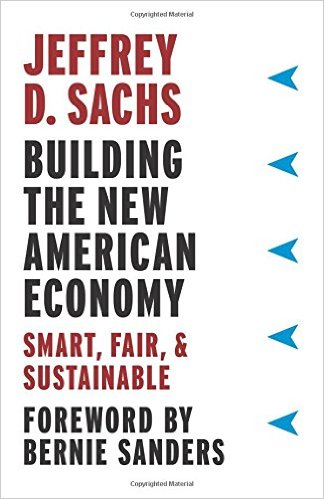 ● Building the New American Economy: Smart, Fair, and Sustainable
● Building the New American Economy: Smart, Fair, and Sustainable
By Jeffrey D. Sachs
Summary via publisher (Columbia University Press)
In this passionate and powerful book—part manifesto, part plan of action—the renowned economist Jeffrey D. Sachs offers a practical strategy to move America, seemingly more divided than ever, toward a new consensus: sustainable development. Sustainable development is a holistic approach that emphasizes economic, social, and environmental objectives in shaping policy. In focusing too much on economic growth, the United States has neglected rising economic inequality and dire environmental threats. Now, even growth is imperiled.
● Sustaining Capitalism: Bipartisan Solutions to Restore Trust & Prosperity
By Steve Odland and Joe Minarik
Essay by authors via Fortune
Businesses want to generate jobs and pay good and growing wages, but taxes and regulations can get in the way. Still, government needs to pay its bills – which it is hasn’t done in many years – and regulations can level and smooth the business playing field, not just tilt and block it. Business leaders can respond to popular concerns and make government tax and regulatory systems work better at the same time. We need an adult conversation about how to do that.
● Machine Trading: Deploying Computer Algorithms to Conquer the Markets
By Ernest P. Chan
Summary via publisher (Wiley)
Machine Trading is a practical guide to building your algorithmic trading business. Written by a recognized trader with major institution expertise, this book provides step-by-step instruction on quantitative trading and the latest technologies available even outside the Wall Street sphere. You’ll discover the latest platforms that are becoming increasingly easy to use, gain access to new markets, and learn new quantitative strategies that are applicable to stocks, options, futures, currencies, and even bitcoins.
● Hit Makers: The Science of Popularity in an Age of Distraction
By Derek Thompson
Summary via publisher (Penguin Press)
Nothing “goes viral.” If you think a popular movie, song, or app came out of nowhere to become a word-of-mouth success in today’s crowded media environment, you’re missing the real story. Each blockbuster has a secret history—of power, influence, dark broadcasters, and passionate cults that turn some new products into cultural phenomena. Even the most brilliant ideas wither in obscurity if they fail to connect with the right network, and the consumers that matter most aren’t the early adopters, but rather their friends, followers, and imitators — the audience of your audience.
● The Currency of Confidence: How Economic Beliefs Shape the IMF’s Relationship with Its Borrowers
By Stephen C. Nelson
Summary via publisher (Cornell University Press)
The IMF is a purposive actor in world politics, primarily driven by a set of homogenous economic ideas, Stephen C. Nelson suggests, and its professional staff emerged from an insular set of American-trained economists. The IMF treats countries differently depending on whether that staff trusts the country’s top officials; that trust in turn depends on the educational credentials of the policy team that Fund officials face across the negotiating table. Intellectual differences thus lead to lasting economic effects for the citizens of countries seeking IMF support.